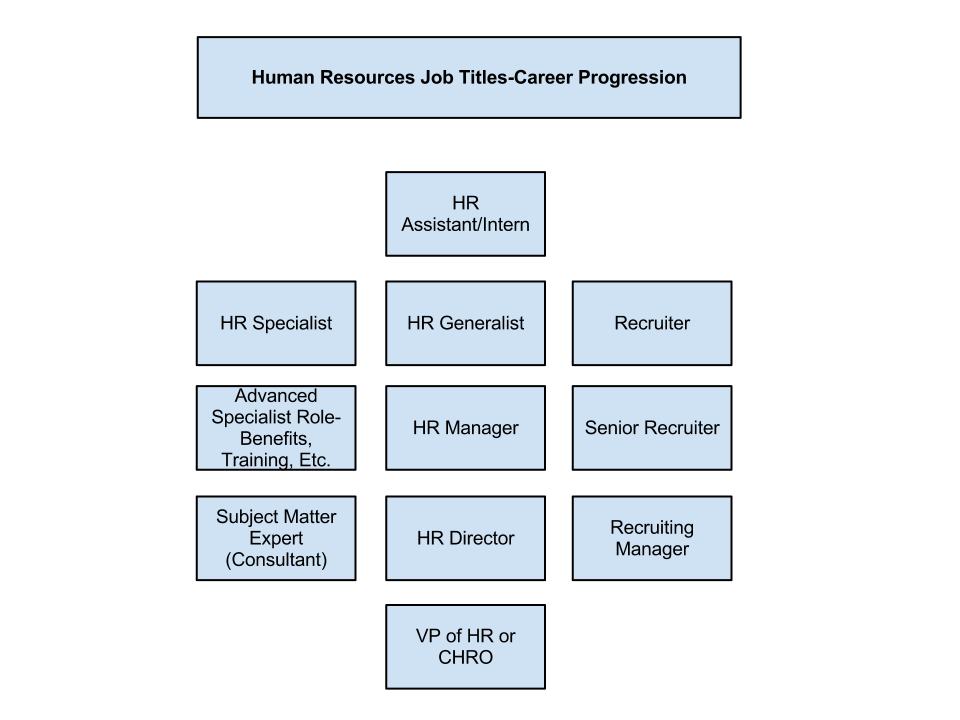Hi Friends,
Hope you are doing Well!!
Today, Lets get an idea about the HR Job Titles and their Duties. HR’s career ladder is never quite clear. But lets try to find out the HR career ladder.
Today we’ll look at some of the various common titles as well as some career development choices you’ll have to make as an HR pro (generalist, specialist, or recruiting tracks).

List of Human Resources Job Titles and Duties
- HR Assistant/Intern-Performs lower level, repetitive HR tasks. Takes direction from senior HR staff. More info on this specific role in the Entry Level HR Jobs guide.
- HR Specialist/Generalist/Administrator-Performs tasks within a range of focus areas and of varying complexity. (See chart below for different career tracks of specialist and generalist.)
- HR Manager-Manages HR department staff and accomplishes high level HR activities reserved for senior level staff (negotiating with vendors, creating policies, etc.).
- HR Director-In some companies this position is very similar to the HR Manager role. The key difference is that in smaller companies the HR director can report directly to the CEO.
- VP of HR-Normally seen only in mid-size or larger companies, this is a top level HR position. Decisions are made at high levels with significant impact to the organization. Strategically focused.
- Chief HR Officer (CHRO)-Normally seen only in mid-size or larger companies, this is a top level HR position. Decisions are made at high levels with significant impact to the organization. Strategically focused. Works with other “C-suite” individuals to develop HR plans affecting the entire company.
Human Resources Job Titles-Progressing Up the Ladder
Check out the diagram below for a general idea of the career progression for an HR pro. The basic idea (in my opinion) is the higher up the chain you go, the less hands-on HR work you do (recruiting, employee relations, etc.) and the more strategic you get (negotiating with vendors, working to forecast staffing levels and recruiting plans, etc.). Also, the higher you go, the bigger the decision-making power and impact.
One thing to note is the split after the first row. There are numerous career tracks, and there are rarely two people who follow the exact same path.
Human Resources Job Titles-Specialist vs. Generalist
Do you want to be a specialist or a generalist? It depends on a number of factors, including personal preference. Some people love training and development. Others want to work in labor relations. If that’s your calling, then by all means go for it and find a job that will sustain your passion for HR in that niche. Company size can also affect the call toward either side of the spectrum.
A smaller company will want a generalist that can handle the variety of tasks that fall under the HR umbrella.
Larger companies need subject matter experts. As an example, they want someone who doesn’t just have a grasp on the Family Medical Leave Act-they want someone who can tell them the nuances of it, where their legal risk might be, and how to develop training to ensure managers handle it well.
Recruiting-HR’s Cousin
This is a question I get quite a few times, so I wanted to cover it here. For a new HR pro, recruiting can be a differentiation tool. Learning to recruit and source candidates is a highly marketable skill, and it can set you apart from other candidates all other things being equal.
One word of caution-I’ve worked with people who spent years in recruiting roles who wanted to move to HR, but their extensive recruiting experience pigeonholed them as a “recruiter,” not as an HR pro. I would say that there is a limit to how many years you can work as a recruiter and still be a viable candidate for HR positions.

No comments:
Post a Comment